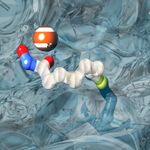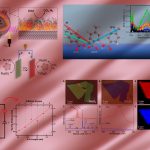BIOCHEMISTRY AND CHEMICAL BIOLOGY
|

|
Biological chemistry research focuses on protein structure, peptide chemistry and biomodel systems, and bioinorganic chemistry. Within biological chemistry, biophysical chemistry explores the connections between physical chemistry and the chemical function of biological molecules. Protein folding, nucleic acid structure, biological electron transfer, and macromolecular dynamics are some of the topics investigated by this group of researchers, using both experiment and computation. Although most chemists use analytical chemical methods in their work, the research of some faculty focuses on the development of methods for the analysis of biological activity and detection of biological molecules. |
CATALYSIS
|

|
The development of catalytic processes is of paramount importance in addressing a range of scientific challenges from the perspective of energy science and sustainability to novel methods for constructing small molecules. At BU, our approach to solving important problems in catalysis science is through combined collaborative efforts in a variety of subdisciplines at the intersection of physical chemistry, inorganic chemistry, and synthetic organic chemistry. Through systematic catalyst design and mechanistic study, we incorporate renewable energy (i.e., light, electricity) to improve existing technology and inform improved design strategies. The Department of Chemistry has expertise in photoredox catalysis, electrocatalysis, and transition metal catalysis, offering a diverse blend of catalytic technologies to push the frontier of energy science and chemical synthesis. |
COMPUTATIONAL & THEORETICAL CHEMISTRY
|

|
Theoretical and computational chemistry research at BU spans multiple areas including protein structure and dynamics, dynamical processes in liquids, quantum dynamics, quantum control, photochemistry, electrochemistry, and materials science. The research groups leverage the power of statistical mechanics, quantum dynamics, quantum chemistry, and AI to explore fundamental physical processes and those of practical chemical relevance. |
INORGANIC CHEMISTRY
|

|
Research in inorganic chemistry spans the continuum from small molecule systems to metalloproteins, from the investigation of the reactivity properties of synthetic complexes to the use of metal-based reagents for probing protein-DNA interactions. |
PHYSICAL & MATERIALS CHEMISTRY
|

|
Physical and Materials Chemistry investigates the structure, function, and reactivity of molecules and materials to elucidate the fundamental principles and driving forces that determine these properties. Physical and Material Chemistry also plays an eminent role in unravelling the molecular mechanisms that rule living systems. Specialty areas include nanotechnology, photonics, and biophysical chemistry. |
SYNTHETIC ORGANIC CHEMISTRY
|

|
Synthetic organic chemistry is a vital component of Boston University’s commitment to research and teaching in the life sciences. At BU, our approach toward synthesis is highly interdisciplinary, drawing on both traditional and modern synthetic techniques to access highly complex molecules. The Department of Chemistry is at the forefront of new methodologies in the synthesis of complex natural product molecules, macromolecules, stereochemistry, asymmetric synthesis, and catalysis. With collective expertise in a wide range of innovative techniques for molecular construction, collaboration between groups is effortless and highly encouraged. The scientific creativity, exceptional productivity, and training excellence of our research groups are demonstrated by uninterrupted, large-scale grant support, numerous patents, and highly successful graduate students who have achieved leadership positions in academia, industry, and federal research agencies. |



